Rights-Based Approach to Conservation Empowers Communities in the DRC
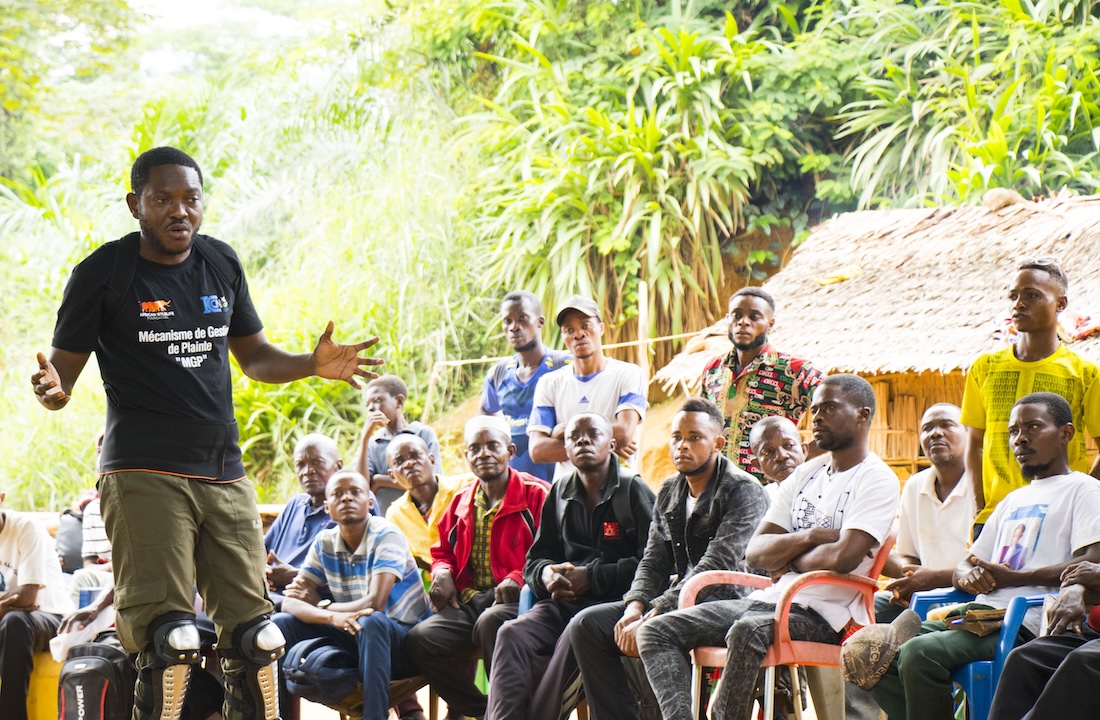
AWF Senior Social Safeguards Officer Dodo Moke engages communities in Maringa Lopori Wamba in DRC
The Maringa-Lopori-Wamba (MLW) landscape in the Democratic Republic of Congo (DRC) spans 74,000 square kilometers—an area roughly the size of Ireland. Located in Equateur Province northeast of Kinshasa, the nation’s capital, it is a sanctuary for endangered species such as bonobos and forest elephants while sustaining local communities. However, this vital ecosystem faces threats from deforestation, illegal hunting, and unsustainable resource extraction.
For nearly two decades, the African Wildlife Foundation (AWF) has worked alongside Indigenous Peoples, local communities, and government authorities, including the Institut Congolais pour la Conservation de la Nature (ICCN), to protect this biodiversity-rich landscape. Through a rights-based conservation approach, AWF integrates community empowerment and biodiversity preservation, ensuring a sustainable future for both people and nature.
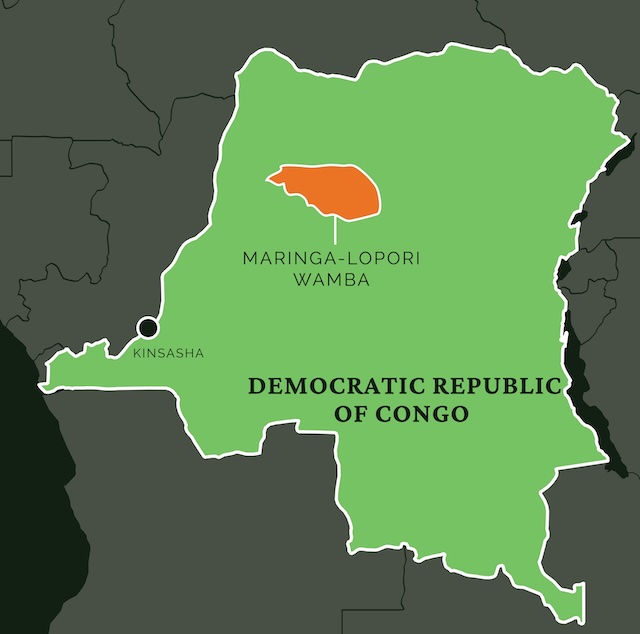
Map of Maringa Lopori Wamba Landscape in DRC
Recently, AWF’s Senior Social Safeguards Officer, Dodo Moke, and DRC Communication Assistant, Rachel Emisave, traveled to remote areas of the MLW landscape to raise awareness about rights-based conservation. AWF’s enduring collaboration with local communities has led to the establishment of protected areas such as the Lomako Yokokala Faunal Reserve in 2006 and the Iyondji Bonobo Community Reserve in 2011.
AWF’s rights-based conservation approach emphasizes the importance of recognizing and respecting the rights of Indigenous Peoples and Local Communities (IPLCs) while ensuring their active involvement in conservation initiatives.
“The rights-based approach ensures that IPLCs actively participate in decision-making processes that impact their lives and environments,” Moke explains. “It’s about recognizing their contributions and preserving their ancestral knowledge.”
Navigating the Challenges of Remote Conservation
Reaching the MLW region requires overcoming significant logistical challenges. Starting in Kinshasa, the AWF team embarked on a three-hour flight to Lisala, followed by a pirogue ride across the Congo River and a grueling 180-kilometer motorcycle journey on sandy roads to Bongandanga. Over the next week, they traveled more than 1,200 kilometers to engage with communities in Ilima, Lingunda, and Iyondji, navigating muddy paths, steep mountains, and overflowing rivers.
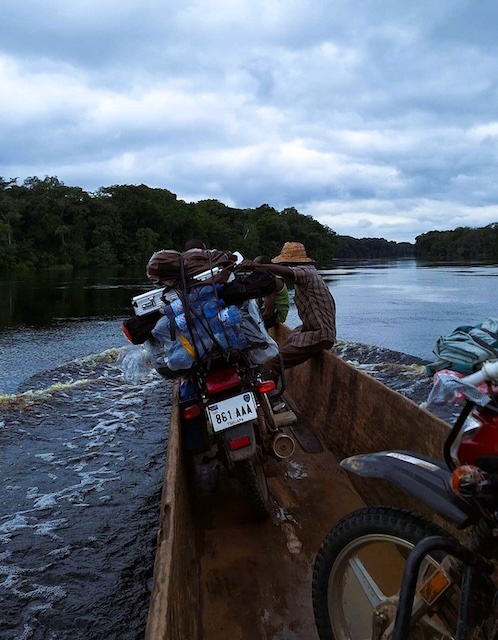
Crossing Maringa River.
Despite these obstacles, the team’s resolve was reinforced by the critical importance of their mission. “Every stop allowed us to witness breathtaking landscapes and reaffirm the urgent need to protect this ecosystem,” Moke reflects.
Community-Led Conservation in Action
AWF’s rights-based conservation model has brought tangible benefits to local communities. In Ilima, scouts trained by AWF patrol forest concessions while respecting the rights of the local communities. “We are the first protectors of these ecosystems,” says Jean-Claude Lia, head of the Ilima scouts. “Establishing this complaints management mechanism reassures us that everyone, including eco-guards and the local community, will respect boundaries. This training taught us to respect the rights of everyone, even those who may conflict with the law.”
To address grievances and support marginalized groups, AWF established a complaints management committee led by Indigenous person representatives near Bongandanga.
Moke elaborates, “We couldn’t limit ourselves to the town, as Indigenous Peoples who live 55 kilometers away often feel marginalized by local communities. This mechanism is not a favor but recognition of their contributions to conserving biodiversity through sustainable ancestral knowledge.”
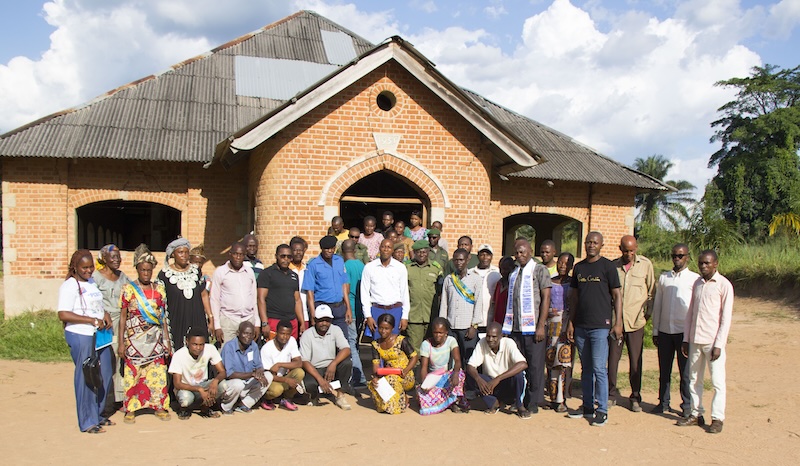
Community members in Maringa Lopori Wamba Landscape following the completion of AWF training.
Since 2019, AWF has empowered the local community to conserve forest concessions through zoning and land-use planning. Scouts are trained to consider human rights during their regular patrols in the Elenge-Fekefeke-Lomako concessions.
Meanwhile, in Lingunda, AWF provides bio-monitoring equipment and training to eco-guards, enhancing their capacity to protect endangered species and habitats.
Transformative Stories of Change
The rights-based approach has inspired both personal and community transformation. Jean-Pierre Lifoku, a local farmer and sustainable development technician, recounts his journey: “I once opposed conservation but changed my perspective after engaging with AWF. Their guidance inspired me to pursue a degree in rural development, and I’ve since shared these lessons with my community.”
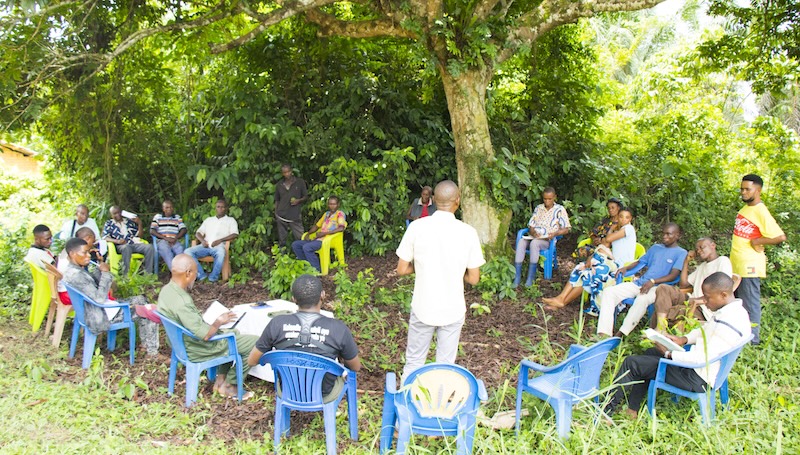
Engaging communities in Maringa Lopori Wamba Landscape
Similarly, through collaboration with organizations like Village Enterprise, AWF equips communities with business skills to reduce reliance on hunting. “Hunting is no longer seen as profitable,” notes Julien Nkono, AWF’s landscape manager. “We train the poorest heads of households in business management and income generation. This has led to a lifestyle change in the communities, and they now view hunting as a less viable activity.”
This initiative has brought significant benefits to local communities. Out of 100 businesses supported this year, 89 are still active, showing a strong success rate. On average, these businesses collectively earn 52,618,100 Congolese francs (around US $18,752) each month. Additionally, Business Saving Groups have saved 2,442,600 Congolese francs (about US $872) monthly, providing a financial safety net and fostering economic resilience for community members.
Chief Bolumbu Nadine of the Boyela group echoes this sentiment, noting that the initiative has deepened her community’s commitment to conservation. “We now understand the benefits of preserving our forests, which act as carbon reservoirs and bring tangible improvements to our lives.”
“While some may undervalue complaints management mechanism, it enhances discipline among eco-guards and builds trust between ICCN and the local communities involved in this vital mission,” Gérard Bofeko, site manager of the Lomako Yokokala Wildlife Reserve adds.
As a vital part of the Congo Basin, the MLW landscape is crucial to global climate change mitigation. “This region’s rich biodiversity and carbon absorption potential make it a cornerstone for future generations,” says Antoine Tabu, AWF’s DRC Country Coordinator.
AWF's rights-based approach seamlessly combines conservation with community empowerment, illustrating how Africa's wild lands can be protected while building local resilience. By centering on community engagement, fostering collaboration, and respecting rights, AWF’s work in the Maringa-Lopori-Wamba landscape is a powerful transformative conservation model, securing a sustainable future for one of the planet’s most biodiverse regions.
Read more about AWF's commitment to conservation in Bili-Uele.